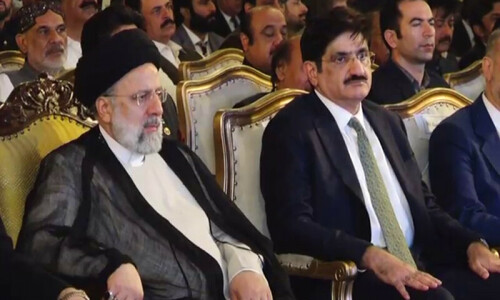RAJA RAM (Multan): The rape of a teenage girl in revenge for a crime committed by her brother has left residents of Raja Ram in central Pakistan shaken and questioning a deeply entrenched system of village justice.
Last month, a council of village elders ordered the rape of the 16-year-old victim after her brother was accused of raping a 12-year-old girl.
The ruling highlighted the role such councils – known as panchayats, or jirgas – play in the lives of many rural Pakistanis, who see the country’s courtrooms as a distant presence.
The councils have traditionally enjoyed broad support, thanks to their ability to offer immediate justice, compared to courts that can take years to settle a criminal case, and as much as a decade to resolve a civil dispute.
But the recent ruling, which allowed a rape victim’s brother to sexually assault another innocent girl, has unsettled Raja Ram, home to some 3,000 people.
“May God have mercy, it was such a strange day and it was such a big injustice,” said villager Amina Bibi.
“In our area there is neither a school nor a hospital, and poverty and ignorance rules here... This incident is a mark of this ignorance,” said 46-year-old Imtiaz Matila.
“It’s a stain on the name of the panchayat,” agreed another villager, 65-year-old Manzoor Hussain.
Last month, a council of village elders ordered the rape of the 16-year-old victim after her brother was accused of raping a 12-year-old girl
The girls have since been taken to a women’s shelter in Multan.
Raja Ram is just a few kilometres down the road, but feels a world away from urban life.
Men sit around on charpoys, sheltering from the blistering heat, while women are conspicuous only by their absence, shielded from view behind the rough stone walls that surround each of the crudely built, single-storey houses.
‘Nothing more dishonourable’
Central Punjab is also home to one of Pakistan’s most prominent advocates for women’s rights – Mukhtar Mai, whose own story offers a window into jirga justice and its brutal mistreatment of women.
In 2002, a jirga ordered Mai to be gang-raped after her brother was falsely accused of rape.
Mai, who lives a few hours north of Multan, made the unusual decision to defy her rapists and take them to court.
But in one of South Asia’s most infamous miscarriages of justice, her attackers walked free, and people continued to rely on panchayats, even as she went on to become a high-profile activist.
“It’s an honour-based system and there’s nothing more dishonourable than the rape of a woman within your family,” explained women’s rights activist Aisha Sarwari.
The men of the aggressor’s family must be shamed through the loss of their women’s dignity, Ms Sarwari explained.
“That’s the balance of power in these communities, which makes sure that women are some kind of collateral.”
‘Jirga law’
The Supreme Court, trying to bring jirgas to heel, declared them illegal in 2006.
But in an apparent backtrack this year aimed at unclogging the slow-moving court system the government passed a new law that promotes village councils as an alternative solution to small civil disputes.
The decision, dubbed the “Jirga Law” by activists, has raised concerns about women’s rights, given the precedents set by the panchayats.
“The decisions of the jirgas have always had a negative impact on the lives of women,” said women’s rights activist Samar Minallah.
The new law does not suggest penalties for decisions like the one made by the council in Raja Ram, added Ms Minallah, who brought the original 2006 anti-jirga petition to the Supreme Court.
But the uproar surrounding the rapes at Raja Ram has spurred the court to demand a full investigation.
Despite her concerns, Ms Minallah is confident that the court will “step in at one stage or another to remind the state that these jirgas are against the constitution and humanity”.
Whatever the court decides, for some in Raja Ram at least, faith in the traditional system has been shaken.
“There used to be wise people in the old days who were making good panchayat decisions,” recalled resident Matila.
“They used to know the realities of the village... but now, these are the panchayat,” he said, dismissively.
Published in Dawn, August 7th, 2017














































